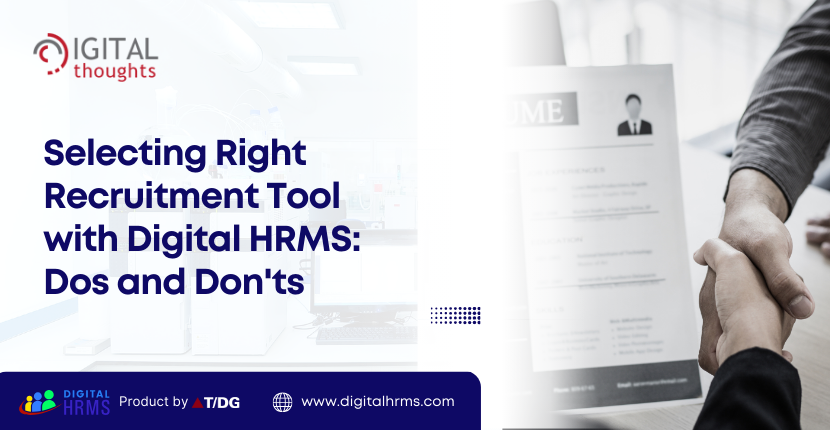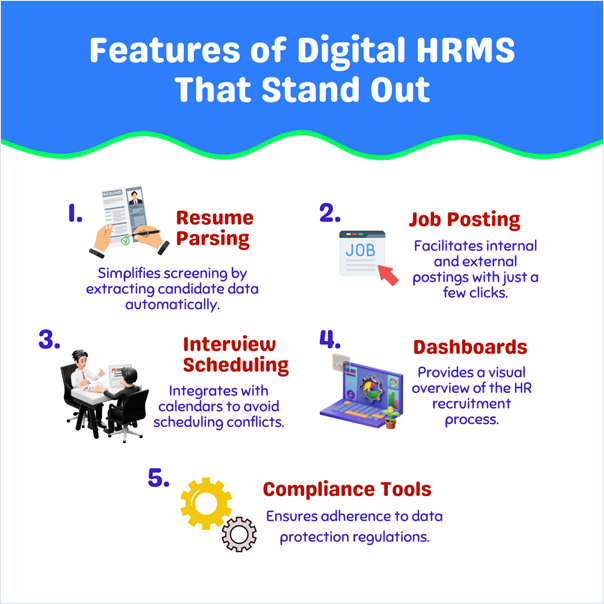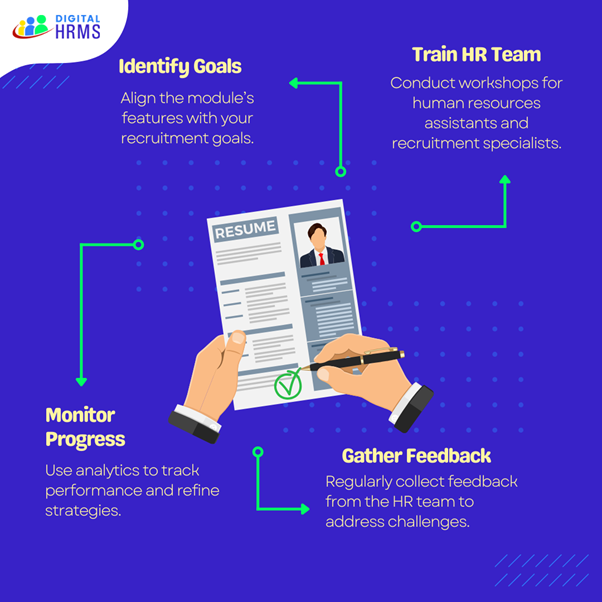Do’s and Don’ts, You Must Know While Choosing Latest Recruitment Tool

At Digital HRMS, we think that implementing an appropriate HRMS (Human Resource Management System) can have great impact on the HR recruitment process, increase efficiency, and enhance the entire HR business partner productivity. Among the latest recruitment tool, Digital HRMS stands out as a comprehensive solution that provides one-stop management of recruitment and selection. However, selecting the appropriate feature needed significant inquiry. In this article, we'll go over the dos and don'ts of using the Digital HRMS Recruitment Feature as your human resources assistant to its full potential and fit with your corporate goals.
What Does the Digital HRMS Recruitment Feature Do?
The recruitment and selection function in recruitment in HRM is an essential aspect that accelerates the recruitment and selection process. It automates HR recruitment process, reduces human mistakes, and increases applicant involvement. Digital HRMS provides a comprehensive approach to recruiting, including everything from job postings to post recruitment.

Here are some key features of the Recruitment Module:
- Job Posting and Requisition Management
- Resume Parsing
- Candidate Database Management
- Interview Scheduling and Feedback
- Recruitment Analytics
- Integration with HR database and performance appraisal process and many more.
The recruitment specialist may focus on important responsibilities like hiring and HR development by knowing the features of Digital HRMS, allowing operational difficulties to be automated.
Do’s While Choosing Digital HRMS Recruitment Module
Assess you HR Needs
Assess your HR recruitment process prior to putting Digital HRMS into place. Identify issues such the HR recruitment process's inefficiencies, communication breakdowns, or delay in recruitment and selection. To identify difficulties, collaborate with your HR business partner and human resources assistant. This signifies that the features meet the requirements of your team.
Evaluate Candidate Database Management
The bedrock of HRM's recruitment and selection strategy is the HR database. Tracking candidate history, resume storage, and searchability are all made easier with a robust database. Ensure that your recruitment in HRM can:
- Parse resumes efficiently
- Maintain comprehensive candidate profiles
- Facilitate HR database security and compliance (e.g., GDPR)
Focus on Integration with Existing Systems
Make sure that Digital HRMS works effectively with your current human resources assistant, including latest recruitment tool and performance review procedures, for smooth HR development. Data flow between departments is improved and redundancy is decreased through integration.

Checklist for Implementing Digital HRMS Recruitment Feature
Look for Customization Options
Industry-specific recruitment and selection processes differ. Choose a feature that allows you to customize the workflow to fit the particular HR recruitment process used by your company.
Prioritize User Experience
More seamless operations are ensured with an interface that is easy to use for both applicants and HR business partner. Check out the Digital HRMS's user-friendly visualizations, real-time updates, and ease of navigation.
Example: Without juggling numerous screens, a recruitment professional can quickly watch the progress of top talent, enhancing accuracy and saving time.
Leverage Recruitment Analytics
Insights are critical in refining your recruitment strategy. Use the analytics feature to:
- Monitor KPIs like time-to-hire and cost-per-hire
- Identify bottlenecks in the HR recruitment process
- Enhance decision-making for top talent acquisition
Include these insights in monthly HR database reports to drive HR development initiatives.
Don’ts While Choosing Digital HRMS Recruitment Module
Don’t Ignore Scalability
Don't pick a module that won't expand with your business's needs. A developing HR database and a growing number of users and tasks should be supported by Digital HRMS.
Don’t Overlook Training Requirements
Although the interface of Digital HRMS is user-friendly, adequate training means that the human resources team reaches its full potential. Ignoring training might result in errors throughout the HR recruitment process and inactivity. Thus, Plan training sessions for your human resources assistants, recruitment specialist, and HR business partner.

A Man Ignoring Training Can Result in Errors
Don’t Neglect Post Recruitment Features
Hiring is only the beginning of recruitment. Retaining top talent also depends on post recruitment onboarding. Make sure the module interfaces with performance review procedures and supports onboarding workflows. For instance, By automating onboarding tasks such as document verification and welcome emails, you can save time and improve the new hire experience.
Don’t Rely Solely on Automation
Automation is cutting-edge, but it cannot take the place of human judgment. When making important decisions, such as choosing a final applicant, always include the HR staff.
Practical Applications of Digital HRMS Recruitment Module
Scenario 1: Streamlining the Recruitment Pipeline
An IT company struggled with a time-consuming manual HR recruitment process. After implementing Digital HRMS, they:
- Reduced time-to-hire by 30%
- Improved candidate engagement with automated communication
- Gained insights into bottlenecks through recruitment analytics
Scenario 2: Enhancing Post Recruitment Onboarding
A mid-sized retail company used Digital HRMS to automate onboarding for new hires. This improved the onboarding experience, leading to higher employee satisfaction and retention.
Scenario 3: Supporting HR Business Partners
HR business partners often juggle multiple roles. With Digital HRMS, they could:
- Access real-time HR database for strategic planning
- Align recruitment efforts with organizational goals
- Collaborate seamlessly with recruitment specialists
Takeaway
Choosing the right HRMS recruitment module is a critical step toward building a successful HR recruitment process. By following the do’s and don’ts outlined above, your organization can optimize recruitment in HRM, attract top talent, and empower the HR partner with the latest recruitment tools. Digital HRMS is a powerful solution that, when implemented strategically, can transform your recruitment and selection process while supporting long-term HR development goals.
Ready to development your HR recruitment process? Take the first step by exploring Digital HRMS today! www.digitalhrms.com
